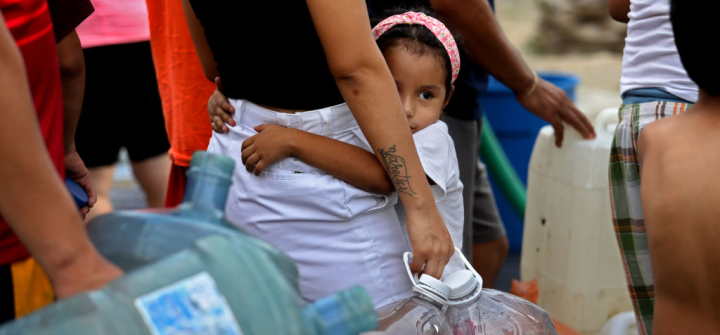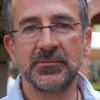Bridging the Water Gap: Social Movements Are Global Health’s Future
In Monterrey, Mexico, a terrible water shortage has families lining up at dry or dirty taps. At the same time, Big Soda is using billions of liters of water each year from public reservoirs to manufacture unhealthy processed drinks.
While beverage companies are enjoying decades of record-breaking growth and profits, Mexico faces its worst water crisis in 30 years and public health and the environment are paying the toll.
With basic drinking water in short supply, it’s not surprising that Mexico is now fourth in the consumption of soft drinks per capita. The explosion in sugary drink consumption has led to alarming increases in obesity and noncommunicable diseases like heart disease, stroke, and Type 2 diabetes.
Obesity is not the only consequence of freshwater grabs by beverage companies. Communities are mobilizing. Citizens in Chiapas, Mexico, have collectively demanded government action to stop Big Soda from draining public wells. As in other parts of the world, the Mexican government has been forced to defer to stop-gap emergency measures, such as installing rainwater harvest systems and instituting water rationing, to supply communities with water. Yet, healthy food policies and clean water are typically discussed as separate agenda items despite their deep connection and mutually supporting solutions.
In communities being exploited by commercial actors like in Monterrey, Mexico, there is a clear opportunity for climate and food policy-focused advocacy movements to work cooperatively. In this case, these efforts must coalesce around the world’s most invaluable resource: water.
The public health community often silos itself based on exposure, disease, or topic. There are infrequent instances of collaboration with other social movements. The need to improve the quality and
equity of food systems is no exception. The global prevalence of obesity has nearly tripled between 1975 and 2006, and this epidemic’s cost is estimated to be over $2 trillion.
Yet some progress has been made. On the demand side, evidence has demonstrated strong, governmental policies such as front-of-package warning labels, sugary drink taxes, marketing restrictions and regulation of public spaces, can both educate consumers and decrease consumption of ultra-processed products. Mexico’s early adoption of front-of-package labeling and sugary drink taxes have been a shining example of the potential of these policies.
Despite this success, combating multinational beverage companies, the citizens of Monterrey are still at their mercy, lacking access to clean drinking water. Public health policies need to address the quality and quantity of available clean water and discourage consumption of ultra-processed drinks. The global health community should focus a greater effort on points of intersection between noncommunicable disease prevention and climate change and identify opportunities for intervention.
Mexico is not alone. The beverage industry has captured the water supply in Colombian cities like Hatonuevo, where sugary drinks are much more affordable than water. Sodas have replaced more traditional beverages at family and social events, bringing with it the health harms associated with ultra-processed products. And while sodas are among the most affordable food items in the region, children are still regularly dying of undernutrition.
This example of the food and beverage industry’s exploitation of economically disadvantaged communities has not gone unnoticed. Healthy food advocates in Colombia have begun linking their advocacy work to local discussions of food sovereignty, water capture, and sustainability. Through their tireless work pressuring policymakers and stakeholders to regulate the proliferation of ultra-processed foods, advocates have initiated discussions around the industry’s water capture.
On this World Food Day, the UN clearly states, “Water is life, water is food. Leave no one behind.” Alongside the introduction of healthy food policies, it’s our responsibility as global health leaders to ensure the climate and water-related impacts of the food and beverage industry are on the global agenda.
There are clear opportunities to identify and address how ultra-processed food production affects water availability, and its other consequences, such as land usage and biodiversity. As public health leaders, we must not allow the continued privatization and monopolization of public water for industry profit.
More significant resources should be allocated to researchers examining the adverse climate impacts of industrial-scale food production. Their findings should be utilized to implement evidence-based interventions like renewable water sources as well as policies, such as firm industry regulation and penalties for violators.
Water access and healthy food are inextricably linked, as the citizens of Monterrey and Hatonuevo know well.
Alejandro Calvillo is director of El Poder del Consumidor, an independent civil society organization committed to promoting and defending consumer rights in Mexico, in addition to advocating for social, corporate, and State responsibility and sustainability.
Yessika Hoyos Morales is treasurer of the Colectivo de Abogados y abogadas José Alvear Restrepo (CAJAR), a nonprofit organization committed to defending and promoting human rights, environmental rights, and the rights of peoples throughout Colombia.
Trish Cotter is global lead for the Food Policy Program at Vital Strategies, a global health organization that works with governments and civil society in more than 80 countries to design and implement evidence-based strategies that tackle their most pressing public health problems.
Join the 50,000+ subscribers in 170+ countries who rely on Global Health NOW summaries and exclusive articles for the latest public health news. Sign up for our free weekday newsletter, and please share the link with friends and colleagues.
A young girl waits in line for not potable water delivered by a tanker truck in Colonia Mirador de Garcia, northwest of Monterrey, Mexico, on Tuesday, July 19, 2022. Image: Gary Coronado/Los Angeles Times via Getty







